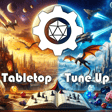
Power Up with Pulp!
In this episode of Tabletop Tune Up, learn how to borrow the key elements of pulp storytelling to add thrills and chills to your games. Pulp is a style of storytelling distinct from the 1930's time period it is often associated with. Pulp stories tend to feature powerful, virtuous heroes, dastardly villains, exotic locales, and high octane over the top action. As a storytelling approach, pulp influences go beyond the 1930's adventure and detective fiction to include the science fiction of Flash Gordon (which inspired Star Wars) and the fantasy adventures of Conan the Barbarian. So try a little pulp in your next game and let us know how it turns out! You can reach us with Tune Up ideas at tabletoptuneup@gmail.com. To learn more about the Lester Dent Storytelling formula, click here.
